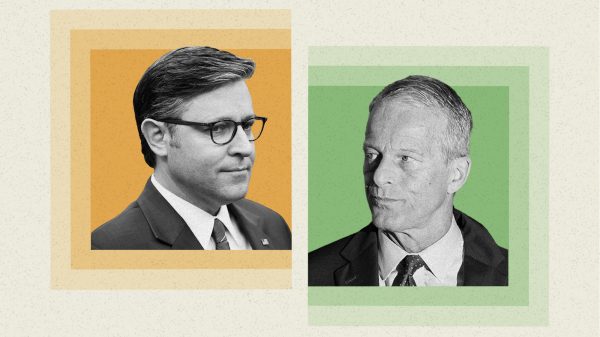Speaker Mike Johnson and Senate Majority Leader John Thune have largely worked in lockstep since January. This week, they hit a rough patch.
The two men are known for rising above whatever theatrics are embroiling their respective conferences. But in recent days they became enmeshed in just that, when they publicly split and shadowboxed over a pair of internal GOP dilemmas over politically toxic issues.
The fissure emerged when Johnson trashed a measure that Thune tucked into last week’s government funding deal to allow senators to sue the government and reap damages for electronic records seizures. With the Louisiana Republican calling the provision “a bad look,” the House Wednesday unanimously passed a bill to repeal it in a major rebuke.
Johnson suffered his own loss at the hands of Thune this week when the South Dakota Republican rebuffed the speaker’s calls to amend the House’s Jeffrey Epstein disclosure bill to include more protections for victims and whistleblowers. The Senate passed the bill by unanimous consent, after months of Johnson trying to slow it down in the House and ultimately succumbing to an end-run by Rep. Thomas Massie (R-Ky.).
In an interview Wednesday, Thune downplayed the episodes, calling the phone records provision a “Senate issue” to work through and noting the congressional debate over the Epstein files “took on a life of its own” in the final stages.
“We work very well together. Communicate regularly. There are always going to be hiccups along the way,” Thune said. “And I’ve served in the House. They are very different institutions and different cultures and ways of doing things but we make it work.”
The split marked an unexpected round of turbulence for the mild-mannered GOP leaders, who meet weekly when both chambers are in session and are generally viewed as having a good working rapport.
Now they face two huge challenges they will need to navigate together: Obamacare subsidies are set to expire at the end of next month, threatening health insurance premium hikes for millions of Americans, and the leaders face competing factions in both chambers when it comes to how to respond. In January, Thune and Johnson will once again have to rally their members around a bill to avoid another government shutdown. At stake in all the fights is how the GOP’s handling goes over with voters ahead of next year’s midterm elections.
The friction points reflect a well-worn dynamic of congressional life — the House and Senate operate at times in split-screen political realities despite Thune, Johnson and their conferences belonging to the same party.
Thune, like most of the Senate, didn’t know Johnson before the low-key House member ascended to the speakership in the fall of 2023. But the two men developed a rapport before Thune took over as GOP leader in January. They are viewed as more aligned in their day-to-day operations and temperament than some of their predecessor pairings, including former Senate GOP leader Mitch McConnell and the House’s former top Republican Kevin McCarthy.
“They work well together. And they get along well,” Sen. John Hoeven (R-N.D.), a close Thune ally, said of the two GOP leaders. “They not only have a professional relationship, they like each other.”
Another Republican senator who knows Thune and Johnson said they had “worked very well together” so far, adding that some tension between the two chambers is “probably healthy.”
“They’re very similar,” said the senator, who was granted anonymity to speak candidly about the leaders.
That doesn’t change the fact that senior House Republicans, including some Johnson allies, are still smarting over the inclusion of the payout language for senators in last week’s funding package. It was designed to give special recourse to Senate Republicans who had their phone records seized during Jack Smith’s investigation into Trump’s 2020 election interference. House Republicans have said they didn’t learn about it until after the Senate passed the bill and it was the House’s turn to act on reopening the government.
For an angry swath of House Republicans, the episode reinforced their long-standing anxieties about being jammed by the Senate and painted Johnson — who also said he didn’t find out about the provision until after Senate passage — as embarrassingly out of the loop.
Johnson quickly promised the House would vote on separate legislation to repeal it, and the House passed the rollback Wednesday night with zero opposition. Thune also got an earful from his own members during a closed-door lunch Wednesday, including from typical leadership allies like Appropriations Chair Susan Collins (R-Maine).
Rep. Chip Roy (R-Texas), a former Senate staffer, said Wednesday as he made the case for repealing the provision ahead of the vote that the House needed to “hip check” the Senate.
Johnson, meanwhile, told reporters that Thune was “a trustworthy, honest broker, and that’s why I was so surprised when we found out about that [phone records] provision.”
Across the Capitol, Senate Republicans believe Johnson dropped a hot potato in their lap in the form of the bill to release the Epstein files. Johnson presided over bitter infighting for months over the bipartisan push to force a vote on the matter. By the time Johnson agreed to it, he was on the verge of being on the losing side of an open rebellion within his ranks and seemingly at odds with Trump, who suddenly urged Republicans to support it Sunday night.
Johnson framed his pivot around a hope the Senate would alter the bill before clearing it for Trump’s signature.
“I talked to John Thune over the weekend. I just texted him. We’re going to get together. We’ll talk about this,” Johnson told reporters as he left the House floor Tuesday following the 427-1 vote to release the files.
But Senate Republicans, including members of leadership, never had an appetite for making changes. Many GOP senators privately made clear they didn’t want Thune to drag out the Epstein discussion as Johnson had, and Thune never publicly opened the door to amending the bill.
Two people granted anonymity to discuss private party dynamics said that if Thune had bowed to Johnson’s push for changes, it would have risked keeping Republicans mired in the Epstein issue for weeks.
“What was [Thune] supposed to do with a bill that passed the House 427-1 … had no objections in the Senate and the president said he’d sign?” one of the people said.
“That is House drama,” said another GOP senator granted anonymity to speak candidly about the situation. “We don’t need that over here.”















